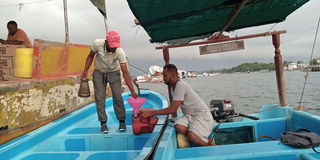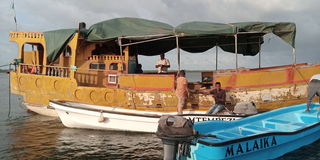Premium
The floating fuel stations of Lamu
Normally, when vehicles run out of fuel, motorists drive into the nearby filling stations, where they refuel and keep on moving to their intended destinations.
In Lamu, the story is different.
All filling stations across the archipelago are located smack right inside the Indian Ocean. This means that motorists, and motorcyclist alike have to depend on boats, and loaders to send the product back to the mainland, or for the 'refueling to happen'.
They are known as floating filling stations of Lamu and are mounted atop huge movable boats.
Ahmed Yusuf, the owner of one of the floating fuel stations in Lamu Old Town says they have always ensured petrol and diesel is available in those filling stations.
Mr Yusuf says he normally purchases his fuel from a renowned distributor who sends his consignment via fuel tankers all the way from Mombasa to the Lamu.
Once the fuel is offloaded at the Mokowe depot, it is then loaded onto their cargo boats that carry it across the Indian Ocean to their floating stations.
“Our floating fuel stations are huge movable boats fitted with special storage tanks. They are also backed up with special jerricans,” says Mr Yusuf.
He says once the fuel reaches where the floating stations are stationed, they offload and load it into the storage tanks fitted in the floating boat stations.
“Thereafter, the fuel is ready to be sold to our customers, majorly the boat operators. We normally refill our floating stations on a weekly basis,” says Mr Yusuf.

A boat operator fueling at one of the Lamu floating filling stations
He says the refilling exercise is always carried out at night, a time when their customers have closed business.
“It’s very rare for these floating filling stations to run out of petrol or diesel unless there is a problem with our suppliers,” says Mr Yusuf.
Lamu Old Town boasts of five established filling stations on the huge movable boats floating in the Indian Ocean.
They include Rehani, Boya, Dola, Mass and Afya.
Apart from boat operators, other recent customers include boda boda riders and the few individuals owning vehicles within the UNESCO World Heritage site, always spotted flocking the floating stations for fuel.
Ahmed Fadhil, a floating station attendant says business in the Indian Ocean is really booming since he can serve up to 2, 000 customers in a day.
But has this always been the way the fuel trade is conducted in this island?
Not really.
Eight years ago, gas and petrol were sold in normal shops, a move that proved to be a danger to the islanders.
In 2014, a building store selling petrol and gas on the Lamu seafront area went up in flames after a suspected case of arson.
Fire incidences had proved difficult to manage owing to the lack of a fire station and necessary equipment on the island.
It is from this incident that the Lamu county government decided that all fuel dealers should relocate their businesses to the Indian Ocean.

The floating fuel stations of Lamu located smack inside the Indian Ocean.
That means anyone seeking fuel must board a vessel to be able to reach where the floating filling stations are and make their purchase in the Indian Ocean.
Mr Alawy Abzein, an elder in Lamu Old Town says the relocation of the petrol stations to the sea has provided the perfect cushion for the island against related fire incidents.
He says locals and businesspeople now operate in peace not fearing for when the next fire would be.
Before that, not a month would go by before a fire incident occurs in the island.
“It was scary. Especially for businesspeople who sold fuel. You slept praying that you do not find your shop has exploded. The last eight years have been peaceful,” said Mr Abzein.
Abdallah Faraj, a coxswain with over 20 years of experience at sea in Lamu says the relocation of the fuel business to the Indian Ocean has greatly benefited them.
He says they can easily fuel up their vessels without necessarily having to walk into a shop like they would, previously.
“Before 2014, we had to anchor our boats and walk around the island in search of fuel shop before finally making the purchase, which was way time consuming,” said Mr Faraj.
Hassan Awadh who is the Lamu Boat Operators Association chairperson called for the establishment of more floating fuel stations along the routes used by long distance shippers, particularly those moving from Lamu Island to far flung islands of Faza, Kizingitini, Mkokoni, Kiwayu and all the way to Kiunga and Ishakani on the border of Lamu and Somalia.
“Our long-distance shippers have a challenge of the lack of a reliable refuelling mechanism along the channels they ply on the Indian Ocean. If you run out of fuel in the middle of the ocean and you do not carry extra fuel, you must call for another boat to buy the fuel and bring it to you, hours away. We need more floating filling stations in Lamu,” said Mr Awadh.





